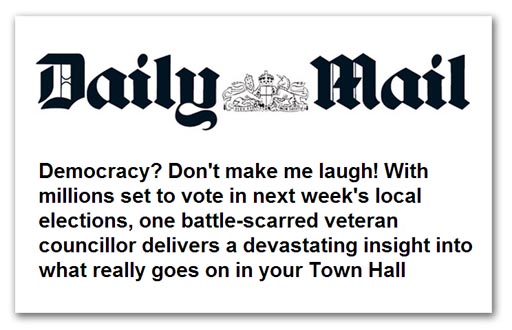Page always makes for entertaining reading and his experiences as a councillor for South Cambridgeshire District Council strike a chord. Councillors, he says, are more interested in feathering their own nests, wasting money on the trappings of office and imposing politically correct drivel on council taxpayers.
As to democracy and independence, he believes the sheep on his farm have more individuality and freedom of thought than most councillors, who are "merely party hacks obsequiously following thediktats of their political masters in Westminster".
When you've finished the piece, though, you are none the wiser as to what to do about an affront to the very idea of democracy. One comes away with the vague sentiment that it was all somehow better in the 1980s and 90s, when councillors weren't paid, there were no party politics and John Prescott had yet to do his worst.
Completely lacking, though – as so often from this type of lament – is any sense of what precisely is wrong and, more to the point, what ordinary mortals can do about it.
Given that the elections are next week, many of the commenters on the piece are directing readers to vote for UKIP, as if that would make a blind bit of difference. We are looking here at a irretrievably flawed system – changing some of the councillors can have only a marginal impact.
In fact, South Cambridgeshire District Council embodies some classic example of the failure of English local government, not least because, in any democratic system, the council has no reason to exist.
Formed on 1 April 1974 after the Heath/Walker local government reorganisation, by the merger of Chesterton and South Cambridgeshire Rural Districts, it surrounds the city of Cambridge, but is separate from it.
With no town in the area and no single population centre exceeding 10,000, and a hundred separate settlements, it lacks a natural focus, relying on a newly expanded Cambourne for its administrative centre to govern a population of nearly 150,000 and increasing.
In democratic terms, a mixed population of commuters, white collar workers, academics, industrial workers, agriculture it lacks a demos, either in geographical terms, or in the sense of there being a community sharing a common interest.
With a population of 150,000, it is only slightly less than half the size of Iceland, a nation in its own right with 56 municipalities. Whatever South Cambridgeshire District Council might be, it is not localgovernment.
These two defects – the lack of a recognisable demos and the sheer size of the population – means that there cannot be anything approaching democracy. And that is without addressing the "power deficit", the fact that the very structure of local government makes it an agent of central government, excluding mere people from the decision-making process.
All of this renders Page's laments a matter of detail. Even if the issues he raises were resolved, his local authority still would not be democratic.
Therein is our problem. The system is so fundamentally flawed that no amount of trimming round the edges will make any worthwhile difference. With a great deal of effort, it might be possible to achieve marginal improvements, but nothing fundamental will change.
Ironically, though, in 2006, South Cambridgeshire was ranked as the fifth best place to live in 2006 and is one of the least deprived areas in Britain. There is, it appears, life without democracy – but we should stop pretending we have democratic local government or, for that matter, ever did have it.
COMMENT THREAD
